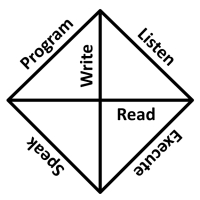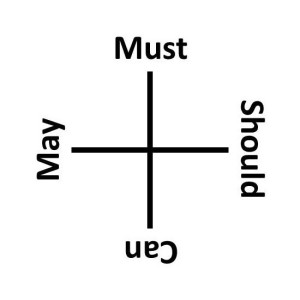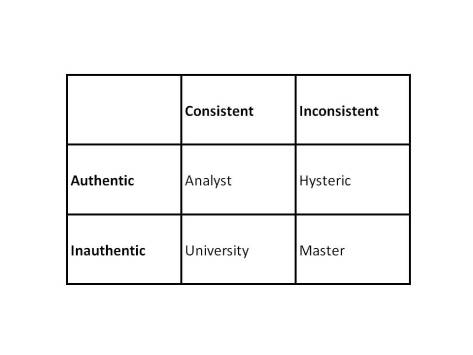 Here’s another simple fourfold and maybe sixfold.
Here’s another simple fourfold and maybe sixfold.
Speaking, Listening, Writing, and Reading are commonly presented together in elementary education as interrelated language skills. One is speaking for a listener and one is writing for a reader. One is listening to a speaker and one is reading a writer.
In the computer age another pair needs to be mentioned, that of programming for computers and the execution or running of that code by the computer. In a way, this new pair doesn’t fit, since one is writing code for computers, not people. And the execution of the program is not performed by a person, but by a computer.
(That’s not entirely true. Programs are also written for other human programmers in mind so that they can debug or maintain or modify the code if the original programmer isn’t available. Structured programming is one method to simplify the logical organization of the program so that others can comprehend it more readily. Object oriented programming is another method to allow multiple programmers to work independently without conflict.)
But perhaps there is a different way to understand these duals. A speaker understands that a listener is following their speech by their response. A writer understands that a reader is comprehending their writing by their response. A programmer understands that a computer is ‘understanding’ the code by its response or output when the program is run.
Also, one can consider speech and writing to be encodings of thoughts into physical representations, and listening and reading to be decoding of the representations back into thoughts. Running or executing a program is not really decoding, or is it? But it is something like processing the speech or writing, like a computer is processing the program.
One might say that listening and reading are like processing the speech and text as programs on the computer of our brains. They are normally thought to be processed as data, as in Natural Language Processing, but it is an interesting twist if one considers them as programs. (Actually, I just recalled that the 1992 science-fiction novel “Snow Crash” by Neal Stephenson used this notion.)
To program effectively the programmer must execute their code in their mind, at least piecemeal and partially, just as a speaker or a writer must listen as they speak and read over what they have written. They can’t understand the full effect of the program’s execution, especially once the program becomes larger than a few statements, just as the full effect of speech or writing that is being processed by another person cannot be completely understood.
Not considered are computers themselves writing programs for other computers to “read” or execute. As the science of artificial intelligence becomes mature, computers writing and reading among themselves may become a common thing. Wasn’t there a news article about that recently? They pulled the plug on that pretty fast.
As digital assistants become more ubiquitous, they are fully participating in our language games of speaking, listening, writing, and reading. Will these so-called virtual assistants program for us next, as in Automatic Programming? That day may already be here.
Further Reading:
https://www.englishclub.com/learn-english/language-skills.htm
https://en.wikipedia.org/wiki/Natural_language_processing
https://en.wikipedia.org/wiki/Automatic_programming
N. Katherine Hayles / My Mother was a Computer: digital subjects and literary texts
Neal Stephenson / Snow Crash
https://en.wikipedia.org/wiki/Virtual_assistant_(artificial_intelligence)
Images:
[*9.50, *10.36, *10.46]
<>







